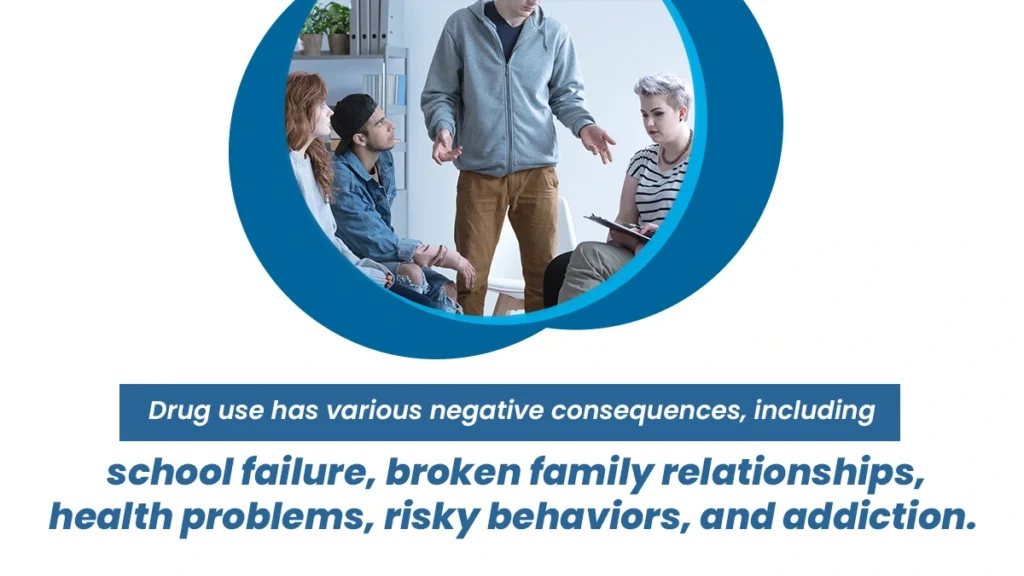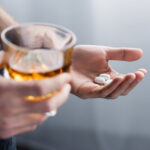
Teen drinking and drug use is a growing problem that affects millions of adolescents around the world. Despite efforts to prevent it, many young people are still experimenting with drugs and alcohol, and the consequences can be severe.
One of the most significant risks of teen drinking and drug use is its impact on the developing brain. Studies have shown that alcohol and drugs can impact the brain’s structure and function, particularly in memory, learning, and decision-making.
Key Takeaways
Excessive use of alcohol and drugs can lead teenagers to horrible consequences if left untreated. You’ll find the following in this article:
- Drug use has various negative consequences, including school failure, broken family relationships, health problems, risky behaviors, and addiction.
- If you think your child is using alcohol or other drugs, talking is the first step.
- Getting professional support can help your child to overcome the issue.
If you are looking for help, get help from The Haven Detox-South Florida. Contact us at (561) 328-8627 to learn more about our treatment programs and service charges.
Drugs Frequently Used by Teenagers
Drug addiction among teenagers includes both legal and illicit substances. Alcohol, prescription drugs, inhalants, and over-the-counter cough, cold, sleep, and diet pills are all examples of substances that are legally accessible.
Marijuana, heroin, cocaine, LSD, PCP, opiates, or opioid medicines are the most often used illegal substances by teenagers in the United States.
Alcohol usage can begin as early as 12, while the average age of first marijuana use is 14. In high school students, marijuana and alcohol use has become widespread.
The most often reported and risky method that teenagers use alcohol is binge drinking, which is described as having five or more drinks in one sitting for males and four or more drinks in one sitting for females.
Drugs and alcohol both affect the brain’s area responsible for pleasure. The brain releases some feel-good hormones as a result of taking these substances. These substances may, at first, make a person feel joyful, energized, social, powerful, and self-assured. Yet, once the first high from the drug or alcohol wears off, they can experience the opposite effects.
Depending on the substance consumed, a person may experience after-effects, including fatigue, anxiety, or depression. Also, chances are increased sensitivity to pain, sleep issues, a lack of interest in routine tasks, and withdrawal from loved ones.
They need more substance to feel good again because the pleasure only lasts a short while. The brain gradually becomes less sensitive to the substance by producing fewer feel-good neurotransmitters.
Substances impair brain performance, making it more challenging to experience pleasure. To restore their positive feelings, some use them in larger amounts, leading to drug and alcohol dependence.
The brain areas responsible for judgment, choice, problem-solving, emotions, learning, and memory are also impacted by alcohol and other substances. They alter the information transmission and processing processes of brain cells.
These brain changes make it more difficult for people to reason and make wise decisions. Also, they may have less self-control than adults.
Symptoms of Alcohol and Drug Use in Teens
Following are some warning signs of teen substance abuse:
- Isolation and secrecy
- Loss of interest in activities they enjoyed in past
- Poor hygiene, including missing showers and wearing the same clothes
- Bloodshot eyes
- Changes in sleep patterns
- Change in eating habits like eating more or less than typical
- Slurred speech
- Mood swings
- Loss of memory
- Lying or stealing
- Poor academics, low grades, and absence from school
- Having problems in family relationships
- Poor concentration or lack of coordination
Why Teenagers Use Drugs and Alcohol
Teens may use alcohol or other substances for many reasons. Some of the most significant risk factors associated with adolescent drug abuse include:
- Genetics
- Peer pressure
- Low self-esteem
- Enjoy the way it makes them feel
- Believing it to be a “grown-up” activity
- Trauma
- Access to drugs or alcohol
- History of mental health issues
Teens tend to try new things and take risks, so they may take dangerous drugs or drink alcohol because it seems exciting. Whatever the reason, it is important to understand the risks associated with teen drinking and drug use and to take steps to prevent it.
Effects of Drinking and Drug Use on Teens
Drug and alcohol abuse in adolescence can have serious and long-lasting effects on physical, mental, and social well-being. Here are some potential effects:
Physical Health Effects
Substance abuse can lead to a variety of physical health problems, including liver damage, brain damage, respiratory problems, and an increased risk of infectious diseases.
Mental Health Effects
Adolescents who abuse illegal drugs such as cocaine, heroin, and marijuana or alcohol are at greater risk for depression, anxiety, and other mental health disorders. Substance abuse can also exacerbate pre-existing mental health issues.
Academic and Social Effects
Drug and alcohol abuse can interfere with academic performance, leading to poor grades, dropping out of school, and reduced future opportunities. Substance abuse can also lead to social issues, including difficulty forming and maintaining relationships, isolation, and legal problems.
Behavioral Effects
Substance abuse can lead to risky behaviors, such as driving under the influence, having unprotected sex, and experimenting with other dangerous substances.
Effects on Family
In addition to personal hardships, substance addiction can put many elements of family life in danger and cause family crises, sometimes leading to disintegration.
Siblings and parents of young people involved in alcohol and drugs suffer severe effects. A family’s financial and emotional resources can be depleted by substance abuse.
Addiction
Another risk associated with teen drinking and drug use is the potential for addiction. Teens may be more susceptible to addiction than adults because of their still-developing brains.
This means that even casual use of drugs and alcohol can quickly spiral out of control, leading to dependence and addiction, which can have long-lasting effects on their physical, mental, and social well-being.
Tips for Parents: Preventing Drug and Alcohol Use
Preventing teens from drinking and drug use can be a challenging task for parents, but several strategies can be effective:
Have an Open and Honest Communication
Create a secure and supportive environment for your child to talk to you about their feelings and experiences. Listen to their concerns and be available to provide guidance and support.
Educate Your Child
Teach your child about the risks and consequences of drug and alcohol use. Discuss the dangers of impaired driving, addiction, and its impact on their physical and mental health and future goals and aspirations.
Monitor Your Child’s Behavior
Keep an eye on your child’s behavior, including their social media activity, and be aware of any changes in their mood or behavior that could indicate drug or alcohol use.
Encourage Positive Behaviors
Encourage your child to get involved in positive activities that keep them busy, such as sports, music, art, or volunteering. Encourage them to spend time with friends who share similar values and interests.
Set Clear Rules and Expectations
Ensure your child knows the rules and expectations around substance use in your home. Be clear about the consequences of breaking these rules and consistently enforce them.
Be A Good Role Model
Set a good example by modeling healthy behaviors, such as not drinking or using drugs in front of your child.
Seek Professional Help
If you are concerned about your child’s drug or alcohol use, seek professional help from a health professional, counselor, or substance abuse specialist. They can provide you with a number of treatment options, including detox, residential treatment programs, outpatient, and multiple therapies to heal the issue.
Treatments for Drug and Alcohol Use in Teens
Several treatments are available to address teenagers’ drinking and drug use problems. Here are a few options:
Detox
Detoxing under the guidance of a healthcare provider can help your child to get rid of alcohol and illegal drugs. Detox facilities prevent drinking alcohol and prevent withdrawal symptoms in a secure and safe environment.
Residential Treatment Programs
Residential treatment programs provide a structured environment for teenagers to receive intensive addiction treatment. These programs offer individual and group therapy, educational support, and relapse prevention skills.
Behavioral Therapies
These treatments help teenagers modify their behavior and develop coping strategies to avoid drug and alcohol use. Examples of behavioral therapies include cognitive-behavioral therapy (CBT), contingency management, and motivational interviewing.
Medications
Some medications can help reduce drug and alcohol cravings and ease withdrawal symptoms. These medications should only be prescribed and monitored by a medical professional.
Family Therapy
Family therapy can improve communication and relationships between teenagers and their family members. It can also help family members understand addiction and develop healthy coping strategies.
Support Groups
Support groups like Alcoholics Anonymous (AA) and Narcotics Anonymous (NA) can be beneficial for teenagers in recovery. These groups offer a sense of community and provide opportunities for individuals to share their experiences and receive support to stay sober.
It’s important to note that not all treatments work for every teenager. It’s crucial to find a treatment that fits the individual needs and circumstances of the teenager. A medical professional can help determine the best course of treatment.
Frequently Asked Questions (FAQ)
What are the effects of drug and alcohol abuse in adolescence?
Drug and alcohol abuse during adolescence can have a wide range of negative effects on a young person’s physical, psychological, and social well-being.
Substance abuse can lead to various physical health problems, including liver damage, heart disease, and respiratory problems. Adolescents who abuse drugs and alcohol are at higher risk of developing mental health issues like depression, anxiety, and psychosis.
The adolescent brain is still developing, and drug and alcohol abuse can interfere with this process, potentially leading to long-term cognitive and behavioral problems. Substance abuse can interfere with an adolescent’s ability to concentrate and learn, leading to poor academic performance and reduced opportunities for future success.
What drugs do teens use?
The number one drug teens use differs from year to year, but the most commonly used include alcohol, tobacco, and marijuana.
Marijuana is one of the most commonly used drugs among teens. Teenagers frequently use prescription medications, such as opioids and stimulants, as well as over-the-counter cough and cold medicines that contain dextromethorphan (DXM).
Some teenagers also experiment with hallucinogens like LSD, ecstasy (MDMA), mushrooms, and inhalants like glue, gasoline, and aerosols.
It’s important to note that drug use can have serious consequences, including addiction, health problems, and legal issues.
At what age do most children try alcohol?
Most teenagers first try alcohol on average when they are just 14 years old. Eighth-graders who have consumed alcohol at least once comprise 38 percent of the population. A little over 10 percent of 12-year-olds report having tried alcohol. By the age of 15, that percentage increases to 50 percent.
It’s essential to note that underage drinking can have severe consequences, including impaired judgment, increased risk of accidents and injuries, addiction, and long-term health problems. Therefore, parents, educators, and society should promote responsible behavior and educate children about the risks associated with underage drinking.
Find Reliable Help at The Haven Detox-South Florida
Teens are more likely to develop an alcohol and illegal drug addiction than young adults. If your child is dealing with substance use disorder and you have no idea what to do, ask The Haven Detox-South Florida to support you.
We offer effective addiction treatment programs, including detox and residential treatment, to help people recover to an addiction-free life.
Our SMART Recovery treatment approach permits teens to learn healthy skills from our psychologists to deal with stress and addiction-developing factors in their schools and surroundings.
Furthermore, our customer support is available 24/7 to answer our clients’ calls. They guide you in choosing the right treatment for your teenager.
Call (561) 328-8627 to speak with our admission counselors and learn more about our treatment programs and service charges.






